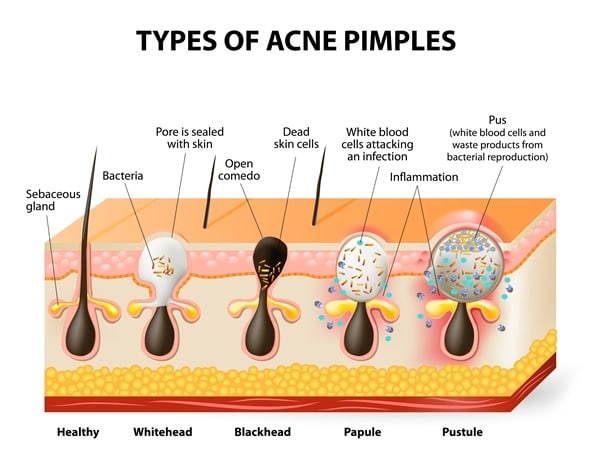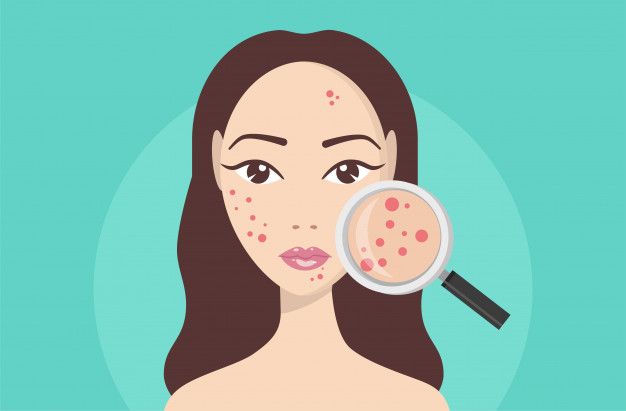What is acne and who gets it?
Acne is a common skin condition that often arises during puberty, but can affect adults too. In fact, around 85% of adolescents have acne, and 50% of 20-29 year olds. It most commonly affects the face, but can present on the neck, chest, shoulders, back and upper arms. Acne spots and bumps can present as whiteheads, blackheads, pimples, cysts or nodules. These can be painful and if severe, can cause scarring.

Acne can have a profound psychological impact on the individual, contributing to low self esteem, depression and anxiety. As such, we have developed numerous treatment options including topical creams/gels, oral medications and procedural therapies. Book an appointment with one of our GP’s online or call 07 3852 4878 to discuss a treatment option suited to you based on the presentation of your acne and your personal preferences.
What causes it?
Sebum is an oily substance produced by the skin to keep it protected and hydrated. Hormones can contribute to an excessive production of sebum, which is why adolescents are particularly susceptible to acne as their hormonal changes during puberty can cause an increase in sebum production. This is also why people may notice acne flare ups before menstruation. Acne appears when the pores of the skin get blocked with sebum and dead skin cells. Bacteria in the skin can become trapped in these pores and contribute to inflammation of the area which can cause redness, pain and swelling. Other factors which may contribute to acne include:
- Genetics
- Skin trauma – repetitive scrubbing with exfoliants, soaps, detergents or other agents
- Pregnancy
- Stress
- Diet
- Dairy has been linked to the formation of acne
- High glycaemic foods have been linked to the formation of acne
- Oil-based make-up or skin products
What are the treatment options?
Depending on the nature of the acne, there are a variety of treatment options, including:
- Low dose contraceptive pills – can be used to regulate the hormones that contribute to acne formation
- Retinoids – a vitamin A derivative that can be applied topically to the affected area or taken by mouth as a pill. Retinoids help by unclogging pores and preventing new blockages from forming
- Antibiotics – these work by controlling the bacteria on the skin that may contribute to acne formation
- Microdermabrasion, light or laser therapy
Consultation with one of our doctors can help determine the best treatment plan for you. If acne persists, you can be referred on to see a dermatologist, who specialises in skin conditions.
What can you do to help prevent or manage acne?
- Avoid popping pimples – this makes scaring more likely and may lead to an infection
- Cleanse with a mild, soap free liquid face cleanser no more than twice a day. Avoid harsh exfoliators and products containing alcohol
- Wash your hands often, especially before applying products to the face. Avoid touching your face unnecessarily
- Avoid excessive sun exposure
- Keep hair clean and off the face
- Choose make-up for sensitive skin – avoid oil-based products and always remove make-up before sleeping
- When shaving, soften the skin and hair with warm water first and use shaving cream and an electric shaver
- Clean spectacles regularly
- If acne affects the back, chest and shoulders – opt for light, breathable clothing to let the skin breathe
If you suffer from acne, book an appointment with one of our GP’s on 07 3852 4878 to discuss a skin treatment plan. We understand the impact a skin condition can have on your self-esteem and mental health so don’t forget to mention how the acne is impacting you.
Sources
All About Acne, Acne Causes, https://acne.org.au/causes/, accessed 16th July 2021
All About Acne, Acne Treatments, https://acne.org.au/treatments/, accessed 16th July 2021
Health Direct, Acne, https://www.healthdirect.gov.au/acne, accessed 16th July 2021
Medical News Today, What you need to know about acne, https://www.medicalnewstoday.com/articles/107146#_noHeaderPrefixedContent, accessed 16th July 2021
UpToDate, Acne vulgaris: Management of moderate to severe acne, https://www-uptodate-com.ezp01.library.qut.edu.au/contents/acne-vulgaris-management-of-moderate-to-severe-acne?search=acne&source=search_result&selectedTitle=2~150&usage_type=default&display_rank=2#H1312600026, accessed 16th July 2021
UpToDate, Acne vulgaris, Overview of management, https://www-uptodate-com.ezp01.library.qut.edu.au/contents/acne-vulgaris-overview-of-management?search=acne&source=search_result&selectedTitle=1~150&usage_type=default&display_rank=1, accessed 16th July 2021
This article was written by April Stevens BSc. MD student.
17th July 2021.

